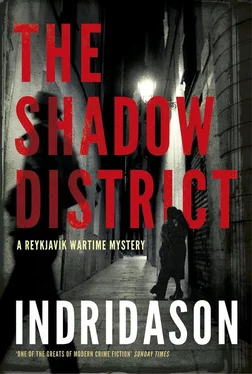The man in the bed lay deathly still.
‘The business of the huldufólk establishes a link between the two girls,’ Thorson went on doggedly. ‘Their stories were identical. Flóvent and I caught the man who killed Rósamunda. He as good as confessed to us. His name was Jónatan. A relative of yours, but not a blood relative. You helped us solve the case; you did your bit for the investigation and effectively incriminated your friend. Case closed. It didn’t hurt that Flóvent and I were already receptive to the idea. We’d made a mistake — Jónatan died in our custody. Perhaps, deep down, we felt that if what you told us was true then he’d got his just deserts for what he did to Rósamunda and there was no need for us to feel so guilty. We latched on to your story. In fact, your testimony couldn’t have come at a better time.’
Hólmbert began to stir and suddenly turned his head towards Thorson.
‘You know what I believe?’ said Thorson, looking him in the eye. ‘I believe it was you. You murdered Rósamunda, and you ruined Hrund’s life and maybe even killed her too. I still don’t know if you’d left the area by the time she vanished but I’m going to find out. You got the idea about the elves from your friend Jónatan. He was the expert. That’s why we were so sure it was him. But it wasn’t: it was you. You’d heard him talking about folklore, about encounters with the hidden people. That’s what gave you the idea. Well, I’m going to make it public; let the world know your dirty secret. Jónatan was innocent when we arrested him. He was innocent, for God’s sake!’
Hólmbert stared at Thorson. The corners of his mouth trembled, his pale eyes began to water and his face twitched as if he were about to speak. His bloodless lips formed a word but all that emerged was a sigh.
‘What?’ said Thorson. ‘What?’
Hólmbert strained with all his might to articulate the word: ‘Ró... samund...’ he whispered.
At that moment there was a noise outside in the corridor, and the door opened.
Konrád drove up to the nursing home. He had called several such institutions in the capital area before finally discovering Hólmbert’s whereabouts. Fortunately, there were no other Hólmberts of a similar age. During his brief phone conversation with one of the staff, Konrád had posed as a friend from the countryside hoping to visit. The woman, who was very chatty, knew a bit about Hólmbert’s circumstances and explained that his condition was getting progressively worse. He had deteriorated, especially in the last few weeks, to the point where he was totally unaware of his surroundings and now required round-the-clock care. All the same, the woman encouraged Konrád to come and see him since visits were always appreciated, even if the patient himself was unaware of them. In most cases the relatives would be grateful. When Konrád asked if Hólmbert received many visitors, the woman said not really; most of his friends were dead and he didn’t have a large family.
Entering the foyer, Konrád approached the reception desk, where he learnt that Hólmbert was on the third floor, and was directed to the lifts. The place reminded him of Vigga’s nursing home. The same combination of bustling staff and shuffling patients; some walking unaided, others reliant on Zimmer frames; some fully clothed, others in their dressing gowns. Inside the rooms the elderly residents lay in bed, asleep, reading or listening to the radio; a few lifted their heads as Konrád walked past.
Hólmbert wasn’t in his room, and when Konrád enquired after him, he was told the old man was in the lounge. He was wheeled there every morning and passed the time staring at the TV. Konrád asked if he was confined to a wheelchair and was told yes, almost entirely these days. In spite of this, he asked if Hólmbert could have left the nursing home at all recently and was assured that he hadn’t gone anywhere for at least two months.
‘I’m afraid his Alzheimer’s is pretty advanced, poor old fellow,’ said the nurse.
Konrád found Hólmbert in the lounge, where he was sitting slumped in his wheelchair, eyes glued to a cartoon. The volume was turned down but he seemed content to watch the flickering screen. He was wearing a warm, blue-checked dressing gown, below which bony, white shins were visible above his slippers. There was a white floss of hair on his head and he had several days’ worth of stubble on his jaw. The eyes in his gaunt face were small and colourless like his hair; his lips invisible around a wrinkled, pursed mouth. He didn’t so much as look round when Konrád drew up a chair beside him.
‘Hólmbert?’ said Konrád.
The man didn’t answer or let this interruption distract him from the screen.
‘Hólmbert?’ Konrád repeated.
Unresponsive, Hólmbert continued to gawp at the cartoon characters.
Konrád had only a superficial understanding of Alzheimer’s, though he had tried to read up on it before coming here. He knew it was a degenerative brain disease that affected the short-term memory but, in its early stages at least, had less impact on the long-term memory. The disease was incurable, despite the development of new drugs that inhibited its progress, and it led slowly but inexorably to utter dependency and loss of the power of speech, culminating in total dementia and death within ten years or so. The disease also had a devastating impact on the next of kin, who were forced to look on, helpless, as their previously fit and healthy loved one fell prey to a pitiless mental and physical decline.
‘I wondered if I could ask you about something that happened a long time ago,’ Konrád said, ‘during the Second World War. It involved two girls, one called Rósamunda, the other Hrund.’
Still no reaction from Hólmbert.
‘Do you remember those names?’
Hólmbert gazed at the television as if he were alone in the room.
‘Hólmbert?’
The old man didn’t answer.
‘Do you remember Rósamunda? Do you remember a girl called Rósamunda who worked at a dressmaker’s?’
As the cartoon finished and another began, Konrád caught a hint of movement through the glass in the door. A man, in his fifties at a guess, was hurrying along the corridor towards the lounge. A slim, handsome figure in a dark suit. Konrád watched his approach, assuming he would turn aside into one of the residents’ rooms, but instead he burst into the lounge and brusquely demanded to know who Konrád was.
‘I heard downstairs that he had a visitor,’ the man said. ‘May I ask who you are?’
‘The name’s Konrád.’ He rose to his feet and held out a hand in greeting. The man shook it briefly.
‘What business do you have with my father? How do you know him?’
‘I don’t actually,’ said Konrád. ‘You are...?’
‘I’m his son. My name’s Benjamín. If you don’t know him, what are you doing here?’
‘I came to ask if he’d had a visitor recently, an old man called Thorson. He may have been using the name Stefán Thórdarson.’
‘Thorson? Stefán Thórdarson?’
‘Yes, but I gather your father won’t be able to help me. My sympathies. It must be a harrowing illness.’
‘Thank you. It is.’
‘Do you know if this Thorson I mentioned came to see him?’
‘Thorson? No, not that I’m aware. Though he may have visited without my knowledge. Dad had a lot of friends... has a lot of friends, and I haven’t met them all.’
‘No, of course not. The thing is, I’m investigating an old criminal case from the war years, and I thought he might be able to help me with some information. But I suppose that’s out of the question.’
‘There’s no point asking him anything. No point even talking to him any more.’
Читать дальше












